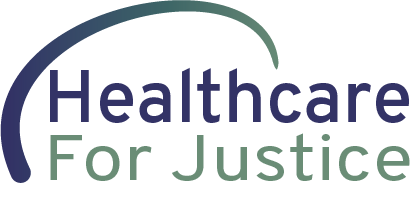Dear Partners,
We hope this letter finds you well and safe. As we have all heard said and likely reflected on ourselves, 2020 has continued to be quite a turbulent and in many ways, difficult year. At Healthcare for Justice, these circumstances have done nothing but strengthen our resolve to live out our mission and to continue to do all that we can to serve some of the most vulnerable among us.
HFJ was founded by a group of people who saw firsthand some of the very real barriers that prevent victims and survivors of human trafficking and domestic violence from seeking and obtaining freedom. These include economic, psychological, and transportation barriers, among others. Our goal, both through our direct primary healthcare model and through our partnerships with other resource-rich organizations, is to remove these harmful barriers. Many of them exist because of the tactics used by traffickers and abusers to exert control over and enslave others. Additionally, many barriers also exist because of the racism that permeates systems and institutions still to this day. Much inequality has been bred from a history of laws and institutions that have either never changed or have not changed significantly enough to right the wrong they have done.
More specifically, we recognize that institutional racism exists within the US healthcare system, and this has, independent of socioeconomic status, been linked to worse health outcomes for racial minorities (1). Additionally, data has shown that people of racial minorities, including US citizens, are at higher risk of being trafficked (2). Taken together, lack of access to health care as well as victimization by modern day slavery disproportionately affects people of color in the United States.
But we can do something that makes change to systemic racism. One thing we can do is stand together with organizations that are actively working against systems of racism and enslavement. At HFJ, we believe that by providing free, trauma-informed health care to any and all victims and survivors who are in need as well as being able to meet our patients in a location where they feel safe, we are working to remove or overcome these barriers. We also believe that by opening this door for victims and survivors of human trafficking, it provides a real opportunity for them to take steps of progress on their journey to freedom.
By partnering with us, whether by subscribing to our updates, spreading awareness, or donating financially, you are acting in support of our mission. Because of you, we at HFJ have been blessed with the opportunity to continue to provide health care during these difficult times. Some highlights from the last three months include:
- Provided consult coverage to our local hospital after training fellow physician colleagues on identifying risk factors for human trafficking – two new patient referrals have come from this already
- Obtained birth control for a survivor of human trafficking that otherwise would not have been able to easily access it
- Met and started therapy for debilitating depression in a new mother who is a survivor of past domestic violence
- Continued to offer in-person visits as necessary as well as telemedicine consults to all of our patients
- Began providing confidential and secure (HIPAA compliant) email as a way to communicate with our patients to improve accessibility
- Our mask campaign has raised awareness of the science behind how we all can easily care for our neighbors and help a local small business (hfjvc.org/mask/)
So once again, thank you for your support. We are deeply honored by the choice you continue to make to partner with us. We know we are not perfect, we are always hoping to learn, and always striving to adapt to best practices as they are discovered. It is only with your help that Healthcare for Justice is able to continue moving forward as we have been doing so far. We wish you peace and good health in these difficult times.
Sincerely,
Anthony Walls, MD
Emily Walls, FNP
Jill Board, CEO
References
- Phelan and Link, Is Racism a Fundamental Cause of Inequalities in Health?, Annual Reviews of Sociology, 2015, 41:311-330, DOI: 10.1146/annurev-soc-073014-112305
- Cheryl Nelson-Butler, The Racial Roots of Human Trafficking, UCLA Law Review, Vol 62, No 1464, 2015, https://ssrn.com/abstract=2655840
